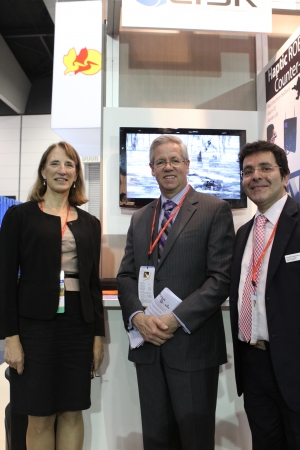Improving a soldier's lot
Research news
Deakin University and the University of Melbourne have joined forces in a partnership that will improve the lot of Australia soldiers serving in hostile environments like Afghanistan.
A Memorandum of Understanding signed in November brings together the Defence Science Institute at the University of Melbourne and Deakin University’s Centre for Intelligent Systems Research (CISR).
The agreement paves the way for the rapid evaluation of advanced combat uniforms and equipment for Australian military personnel.
Human performance on the battlefield depends on the ergonomic effectiveness of equipment including helmets, body armour, eye protection, packs and uniforms.
Equipment is rapidly evolving and new options require evaluation.
Current evaluation requires expensive physical trials and the use of haptic devices that provide feedback to gauge discomfort but restrict the range of test scenarios.
Under this agreement, new research will develop a virtual testing environment able to deliver feedback to testers while simulating a wider range of test scenarios.
“This timely initiative brings together research teams that are recognised as world leaders in this field,” said Professor Saeid Nahavandi, Alfred Deakin Professor and Director of CISR.
“At CISR we have a long history of carrying out research that contributes to national security, including projects in robotics, haptics and simulation for the Department of Defence and DSTO.
“Our state of the art universal motion simulator (UMS) will provide the perfect testing environment for the projects to be undertaken under this initiative.
“The UMS can be programmed to simulate the situations our military personnel find themselves in; providing a real-world experience within a safe, virtual environment.
“Not only can it simulate a realistic sense of touch and feel, but through 3D technology the user is totally immersed in the set training environment and their physical and mental responses can be recorded through systems that monitor brain responses and pulse and blood pressure.”
CISR is home to over 60 highly motivated researchers, and provides solutions to emerging challenging problems.
The multidisciplinary team includes mechatronic, control and software engineers.
This has positioned the team to provide rapid response to problems that demand a systems approach and innovative thinking.
The team has a demonstrated capability of carry out fundamental research and turning their contributions into commercial products.
Share this story
 At CISR we have a long history of carrying out research that contributes to national security, including projects in robotics, haptics and simulation for the Department of Defence and DSTO, says Professor Saeid Nahavandi (right).
At CISR we have a long history of carrying out research that contributes to national security, including projects in robotics, haptics and simulation for the Department of Defence and DSTO, says Professor Saeid Nahavandi (right).
